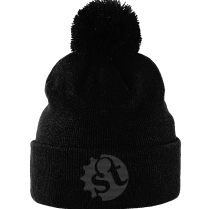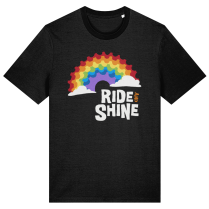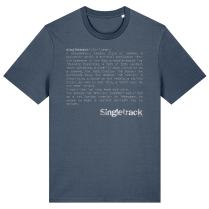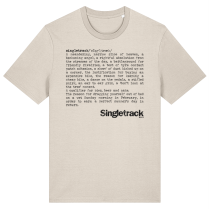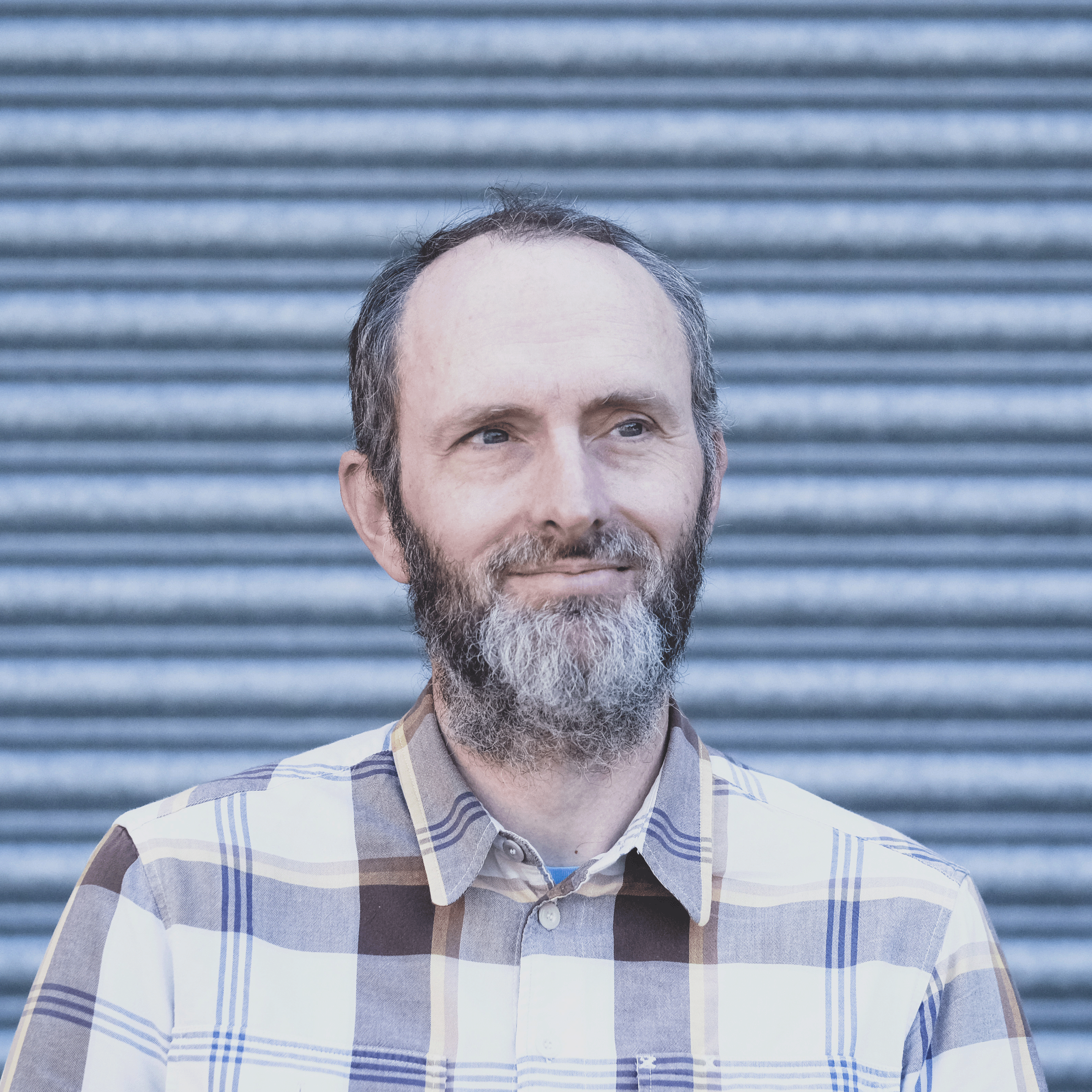A bike tour through Morocco whittles away at daily concerns until all that’s left is what matters.
Words and photography by Petor Georgallou
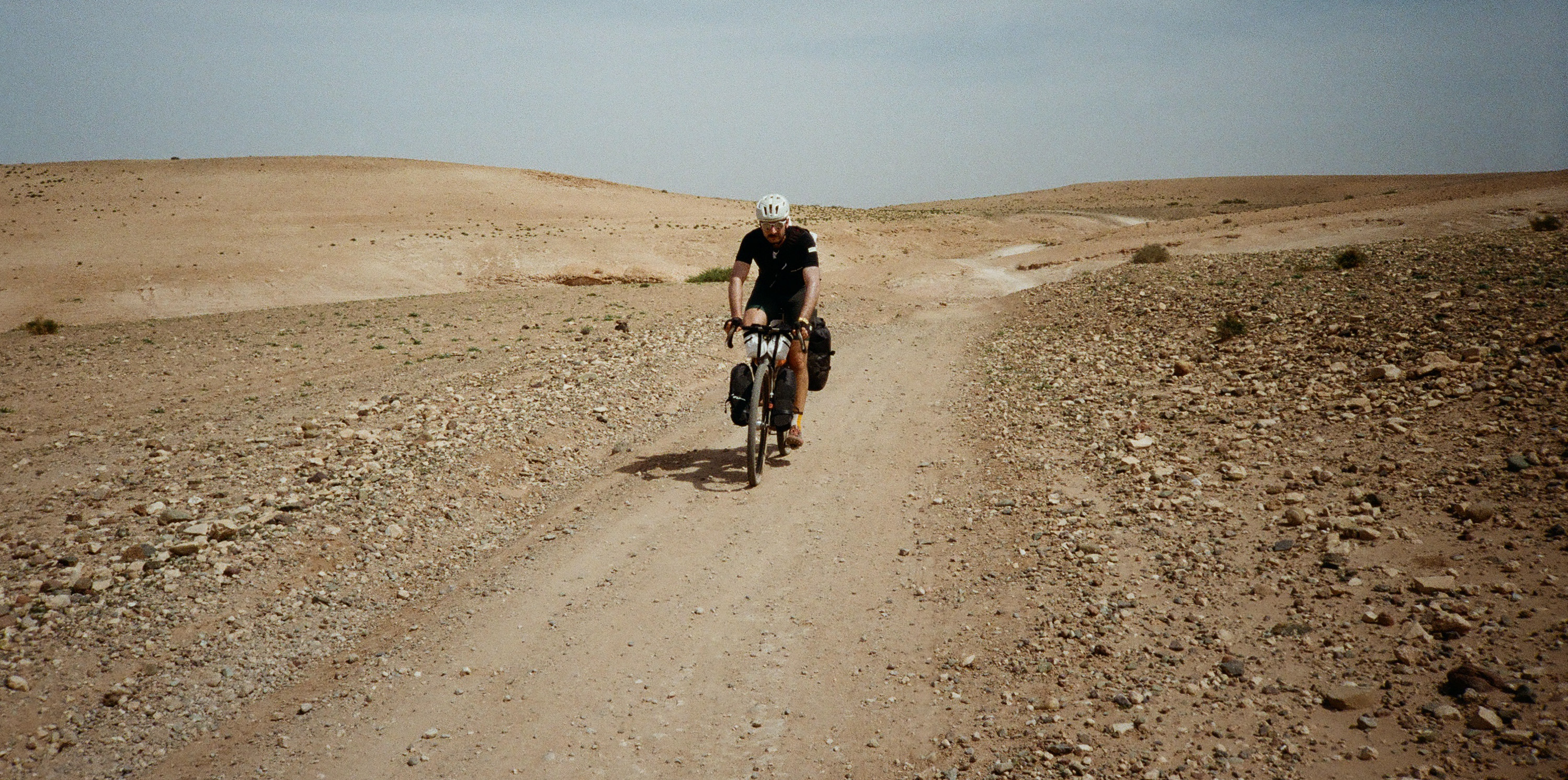
In modernity, we’re not really people. We eat and shit and do all the other things animals do, but for most people – myself included – where art and music and ideas should be has been transplanted by work and tax and two-step authentication. Suddenly, creativity, cycling and good humour feel like an emergency, because if we’re not alive now, and there’s no future, why are we even here?
Each unit of art needs at the very least seven units of nothing to make it, because you need space psychologically to catch an idea and more space to distil the idea into an art. In modernity there’s always something, but usually ten things – which is seventeen more things than the maximum number of things that are conducive to making art, playing music, or any part of humanity. When you can wake up to videos of people being burned alive in their homes, 1,700 unread emails, and a three-page to-do list, and a neatly placed revenge poo under your desk for not having initiated your dog’s morning walk promptly enough, minus seventeen seems like an impossible figure.
Latest Singletrack Merch
Buying and wearing our sustainable merch is another great way to support Singletrack
Seven units of nothing need to come //ITS// before //ITS// making art, so you have to save up on nothing before you can even think about art. You can decide to go cycling and then just go cycling – however irresponsible an idea that is – and hopefully everything will still be there when you get back. While you’re cycling you’re not doing anything else, which is a shortcut to zero things, at least temporarily. I realised that as a byproduct of cycling, I’d have some nothing. I figured that if I only have a very small amount of nothing I should leverage that nothing against a second activity and kill two birds with one stone – by trying to think about making art at the same time.
I had a dream
I had a super vivid dream that a guy with long yellow teeth, leathery skin and a gaunt face with hollow cheeks stole my gold watch. I gave it to him because I was scared not to, but then he got on a camel and was kind of friendly, and invited me back to his house, which was a tent in a scrubby desert made from blue plastic tarps tied down with red and white braided rope. He put my gold watch in a black cast-iron pot on a fire in front of the house and sat me down opposite it in an old wooden chair, and we both watched the pot boiling for hours… maybe days? I was hungry and thirsty and tired, and I started crying because I was so thirsty that I thought I was going to die. It had been weeks, but I wasn’t allowed to stand up or look away from the pot. Suddenly, he stood up and shouted ‘You see!’ So I stood up, and it hurt because I’d been sitting for so long that my muscles had begun to waste away. He put his hand in the boiling water and took the gold watch out and made me eat it. It was soft, like halfway between boiled chicken and a very moist, dense cake. I ate it all and it felt amazing. I got on my bike and rode away – and it felt amazing – like a downhill tailwind.

Wait… where’s your bike gone?
Existential emergency
A few days later, my younger, fitter, taller and better-looking colleagues from Germany asked if I’d like to join them on a ride over the Atlas Mountains in Morocco, and because I had the dream, and existing even momentarily felt like an emergency, I said yes. I didn’t mean I would actually go, it felt like a lie, because, however well intentioned, I still had emails to read and reply to, my teeth hurt and I was out of shape, who would walk the dog? Being a parent is hard enough with two people when you both have to work, so the idea of shirking on that responsibility seemed like something I shouldn’t do. I’d just play along and fantasise until it actually became impossible. If I have no free will then I can do no wrong.
The WhatsApp group began, and the back and forth about routes and equipment plans was quite irritating because I didn’t actually plan to go, but I also couldn’t tell the others that. Cornered by my own lie I smiled and went along, amassing equipment and a plan as a contingency in case it somehow accidentally came to fruition. I had a bike, it was ready to go, except for a couple of bits that I definitely couldn’t get at super short notice. I made the trip into work: if it can be monetised it can be justified, and that could be the decider. I reached out to a few people and got a decent amount of support to make a little film about the trip, which mostly covered the cost of going, while also making it impossible not to go because it meant someone besides me was tangibly invested. There was no time to get fit, but a little time to get fitter, so spurred on by the looming promise of actually getting to ride properly over mountains for consecutive days, I wedged little rides into my work days. I bought an ‘extra genuine’ gold Rolex watch on the internet to honour the dream.
I wasn’t ready, but before I knew it I was sitting at the back of a Boeing A321neo swilling Virgin Marys and diazepam (for a back injury) on my way to Africa. Once through passport control, I could see them – Bennet, Jan, Jule and Jojo (pronounced yan, yule and yoyo); they were ripped and jolly. We unpacked our bikes and put them together before riding through Marrakech carrying our huge bike boxes any which way we could. I’d brought a surplus of equipment along so Bennet carried my box. It looked sketchy, especially riding through the crowded market.
Accruing nothing
The next morning I made a jug of coffee for everyone, using a bag of pre-ground coffee that I’d pulled out of a cupboard at my parents’ house en route to the airport without really looking. It looked a bit clumpy, didn’t smell great and turned out to be four years out of date. We tried it anyway but it was undrinkable. I was out of my comfort zone. We stashed our bike boxes in the basement of the Airbnb and headed to a shop to stock up on supplies before leaving town. The shop was a Lidl in a huge glass air-conditioned mall, so we got avocados and packaged nuts and wraps for the day in this little slice of Germany before heading out of town. We decided to stop for coffee along the way rather than buying instant because cafés are a good way to meet new people. The crowded streets gave way to suburbs which fizzled out into sprawling agriculture interwoven with rutted dirt roads and paths trodden into the land by donkey traffic. We stopped for a moment once we were out of town to eat something and take stock before the real riding began. It was hot and lumpy, the riding was fast and I was sweaty and lethargic from caffeine withdrawal. I felt guilty and ridiculous for fooling myself into thinking that ‘cosplaying-prepared’ would actually make me somehow ready for my first multi-day ride in far too long. I floated the idea of maybe quitting while I was still within reach of the airport, as that would probably be best for everyone.
“We can ride slower.”
“You’ll be fine!”
“|You’re here now; you might as well see how you go.”
F*ck. The f*ckers had me pinned down, and they weren’t going to let me leave without a fight.
A few hours in, we’d been cycling for a few hours and, therefore, a few hours of nothing had been accrued. Hungry, hurting and without Wi-Fi, the nothing, or nothing superfluous had begun to erode the anxiety, doubt and clutter. Not a cure, but definitely a sticking plaster. It was like not having a headache for the first time in so long that I’d forgotten how good not having a headache could be. I’d loosened up, and felt unnervingly lucid riding through sand dunes into the wilderness. In just one day, I started to become more human. Following that trajectory, who knew what could happen in ten days?

Outer city life
Marrakech, while battered by earthquakes and propped up with wooden scaffolds, felt in many ways like any other city, albeit a little bit scruffier than a lot of European cities. Sure there were guys selling sacks of snakes in the market and donkeys were a significant percentage of traffic in the centre, but mostly every which way you look there are hen parties, magnet sellers and Moroccan-themed tourist trap nonsense cultural voids. It wasn’t until we were significantly out of town in the foothills of the Atlas that we began to realise the ramifications of riding during Ramadan.
Ramadan is observed by Muslims all over the world as a month of fasting from dusk till dawn, from one sighting of a crescent moon to the next. The Quran says: ‘Whoever is present this month, let them fast. But whoever is ill or on a journey, then let them fast an equal number of days after Ramadan. Allah intends ease for you, not hardship.’ Which should exempt us from the duties of fasting during Ramadan, even if we were Muslims (which none of us are). Publicly eating, drinking (anything, not just alcohol), or smoking in Morocco during Ramadan can result in fines or incarceration. While there was no evidence of this in bustling Marrakech, the rest of the country observes Ramadan far more diligently. Even as non-Muslims and travellers to boot, it felt incredibly disrespectful to eat or drink in front of locals, so we avoided it. At times this was incredibly challenging, especially with drinking water, which we had limited carrying capacity for. Where we could, we’d stop to re-supply, fill up bottles, etc., and then ride out of town a little before eating and drinking.
They made Space Raiders look like caviar.
Follow your nose
Towards the tail end of a relatively tough first day, we bumped into a couple of English guys on ratty, cobwebbed, shed-fresh ’90s mountain bikes. They’d taken the 50km road route out of Marrakech rather than the hilly, winding off-road route we’d chosen. They had traded sand dunes and lunar landscapes for a dual carriageway. They’d stopped for lunchtime pints on the fringes of the city and were on their way to find a hotel that had ice cream. Yesterday I’d have been jealous. With ten hours of not corresponding behind me, I felt almost human and just a bit sad that they’d be missing out on all the good stuff. I was still tempted to jump ship, but they had the air of people who might watch football and then talk about it, so I decided better the devil I know.
That night we pitched our tents on the side of a hill overlooking a town, among some trees. The first night camping somewhere new is always a little tetchy, especially where you’re close to people and for the most part visible, but we were fine. The sun set over the town and the call to prayer serenaded us as we had our first nightly feast together. The magic of the Atlas is that they are actually remote, so it was our last evening spent in moderate fear of being spotted camping. The next morning we finished off the last of the Lidl foods and set off into the mountains proper with a long, slow, dragging road ascent before turning off into rural nothingness and fast flowy dirt.
By lunchtime, we’d still not found anywhere to resupply, because all cafés, and a lot of shops were closed during the day for Ramadan, and a lot of the small villages we’d planned to resupply at had been badly affected by earthquakes. That is to say that the villages were for the most part rubble, with people living in a new village made up of tarp tents next to the old village, with no access to running water and no functions of municipality that we take for granted, like waste disposal.
I have been cursed with a very large nose, which in itself is not a problem. The problem is that it’s not just ornamental, and so I can smell everything very well all the time, which is more often than not a bad thing in Morocco. In the Atlas there are dead things everywhere, rotting in the sun. Outside each village is a constantly smouldering pile of rubbish that fills the air with the acrid stench of burning plastic. It was a grotesque juxtaposition from the burgeoning falsehood of green and ornate Marrakech. The rest of Morocco felt not only poor but also squalid. The effects of earthquakes in 2019 and 2023 throughout rural Morocco were still widespread and catastrophic, and it was shocking to see the lack of aid for vulnerable people. The hardiness of people living in the Atlas highlighted our own perverse and bloated ideas of what a normal standard of living looks like. That day we ate mostly crisps called ‘Fighter’ which we bought from kiosks where we could. They had virtually no nutritional value and were made from ingredients unrecognisable as human foods. They make Space Raiders look like caviar. Most of our caloric intake that day came from fizzy drinks, warm from fridges not connected to a power supply. It was fine for a day.
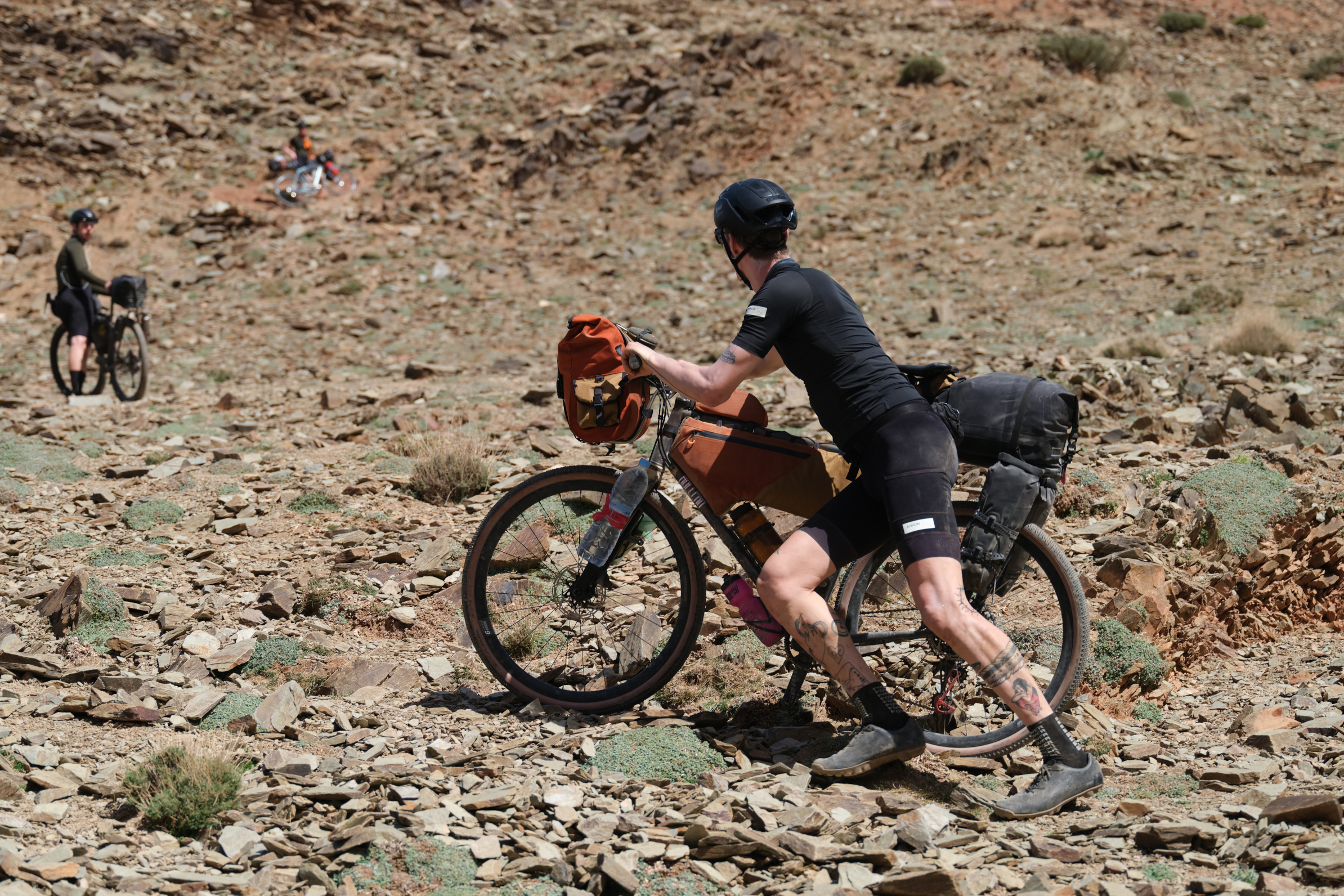
Setting the tone
When David Lynch made the first series of Twin Peaks he was a pioneer of the ‘episode three theory’. People watch the first couple of episodes and tell their friends, so by episode three there’s a much bigger viewership. Interwoven into the narrative of episode three is a catch-up of the first two episodes, so everyone knows where they’re at, and can move forward with the story. On a ride, day three traditionally sets the tone for the rest of the trip. It’s the day you find your stride together as a group, and the day of being in a place long enough to kind of work out the rules, or the way things work there. What the new normal looks like.
That morning we’d run out of water, because there was nowhere on the route to resupply, so for the first time, in a lush green valley with a little stream running through it, we each filled our bottles and our bellies with water from a stream with varying degrees of confidence. Jojo and Bennet drank straight from the stream, Jule and Jan used a water sterilising tablet in each bottle, and I used four drops of iodine solution in each bottle before sterilising the seals on the lid and the threaded part of the neck with more iodine solution. It tasted pretty bad but the prospect of the alternative was worse. We rode on a mile or so towards the mountains where we realised we needn’t have been concerned about the water, as the source of the stream was a natural spring bubbling up out of the rock. However, the path we’d assumed we’d be riding on was non-existent due to landslides. It added a few kilometres onto the journey of much rougher terrain going uphill than we’d expected, so there was a decent amount of hikeabike.
Throughout the trip, kids found us hilarious. My bike was made from 3D printed titanium, Bennet was a foot taller than the tallest person we met in the mountains, and we were all dressed like we came from space. It was no wonder they chased us along, shouting. I’d heard stories of kids throwing rocks at riders for fun during the Atlas Mountain Race, the route of which we were approximately following, so we always approached them with a little caution. Mostly they just asked a lot of questions in broken French and we’d make up answers in worse French, or they’d try to make us say things and then either laugh at us for our accents or whatever silly thing they’d made us unknowingly say. Mostly they just wanted us to give them sweets and nuts – children are exempt from fasting.
20km downhill donkey trail
On one occasion the kids were pushing me up the hill, which was entirely welcome and rewarded with some nuts I had bought from a kiosk a day earlier. Bennet and Jojo had stopped a bit ahead, so when we reached them we stopped and the kids hung around waiting for more nuts. We regrouped before Bennet started climbing up a bank of loose rocks behind some houses, which was close to being a hands and legs gradient. The kids looked perplexed. Soon a lady came out of one of the houses and was shouting ‘no’ and waving her arms. Bennet explained that it was in fact OK because he plotted the path on a map. No one understood anyone, and one by one we followed him up the slope.
“Are you sure this is OK?”
“Yeah it’s just 200m, and then it’s a donkey trail. It’s basically all flat and then downhill to the next town.”
He was still ten years younger and built like a horse conditioned by techno.
Jojo and Jan were ahead now, close to what I assumed was the crest of the hill. Despite having probably the lightest bike, I also had probably the heaviest set-up, since I was making a film at the same time. I had packed for the worst, leaving little to chance because I wasn’t sure I could consistently keep up with a gaggle of crit racers a decade younger than me. I’d estimate that me and my set-up were about 35kgs heavier than Jojo or Jule, and while Bennet was carrying a load of batteries and film-making bits for me, he was still ten years younger and built like a horse conditioned by techno.
It was just past noon, with the temperature climbing towards the 40°C mark. I was running out of water, and Jan had disappeared over the top with the suncream. Reluctantly, I stopped and put on a long-sleeved T-shirt, then put my cycling jersey over my head, under my helmet, to protect my neck from the sun. An hour later we were still scrambling up the rocky slope, with no water and no food. I couldn’t see the others, but Bennet had stopped and offered to help a few times. I was hot, dehydrated and hangry, and I didn’t really want anyone near me to see me behaving like a manbaby. I wanted to be left alone to swear at rocks in peace, with the knowledge that the only way at this point was up and that stopping would result eventually in some kind of survival situation.
At the top, the others were eating a bag of peanuts. Jojo, who’d been waiting patiently for me for half an hour, had the superpower of always having peanuts. We ate some nuts and took some photos. I drank someone’s water, which had become tepid tea temperature, but didn’t taste like iodine and we continued to the ‘ridgeway’. This was a steady incline, which felt flat-ish compared to the last couple of hours of scrambling, but was mostly unrideable, as it was made up of big loose rocks. Manageable on an enduro bike, but not on a loaded touring bike with 45c tyres. Over the ridge, the route was more Rampage than any of us expected, so we carefully descended, tripod-ing with both brakes onwards to what Bennet asserted repeatedly was a ‘20k downhill donkey trail’ to the next town. I could clearly see it was a dried-up river bed going up the next hill.
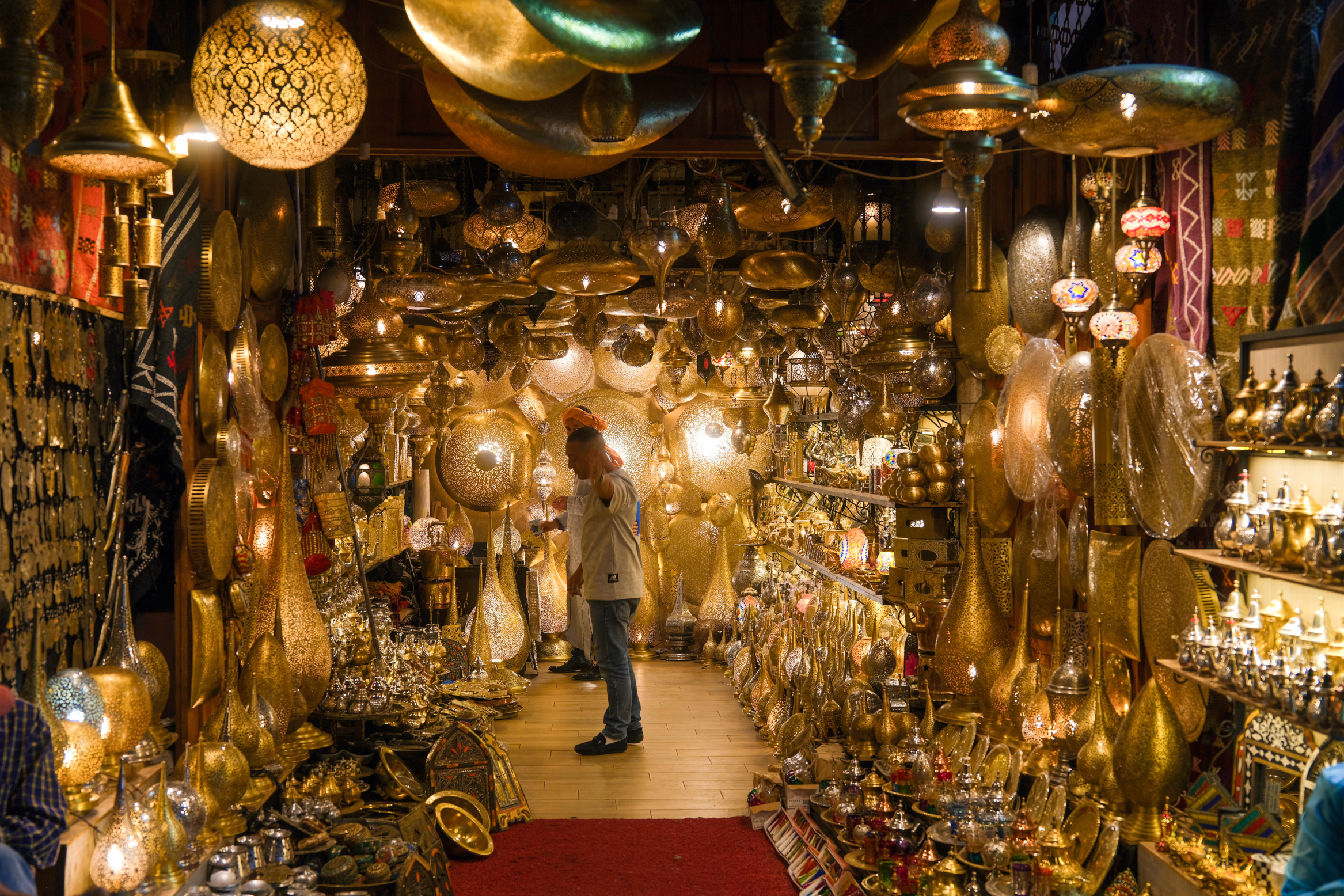
Beyond nuts
There were stagnant pools of greenish water filled with mosquito larvae when we reached the river bed, and I was thirsty enough to be tempted. We continued the bike hike for another hour or so up the next hill into a village that had mostly been demolished. Thankfully there was a shop where we loaded up on peanuts and olives and where the proprietor allowed us to drink water and fizzy drinks. Occasionally a truck would come past and he’d exchange a gallon water bottle filled with what I assume was diesel with the driver through the window. The rest of the day didn’t get much easier. After a long and very fast road descent, we stopped again to fill up on water and low-grade crisps and nuts, before a long flat road section where we huddled together to break the wind. That night we pitched our tents in a dry river bed filled with cattle bones and rubbish. People dump rubbish in them because there’s nowhere else for it to go and when the river floods, all the rubbish gets washed away.
The hard part of being hungry in the mountains wasn’t the ‘being hungry’ itself. Instead, it was the not knowing when or if there’d be an end to it as hunger was all we’d known since we got into the mountains. Unlike the others, I was really riding as hard as I could for quite a lot of the time, so doing that without enough food or water felt like a lot very quickly. Nuts and olives interspersed with crisps for salt and some kind of Twinkie-like packet cakes for sugar were our diet for a couple of days. We bought these where we could until we reached the first proper town since Marrakech. There was a market with everything. It was all very real. People showing up with things that they’d grown to sell. Butcher’s shops full of livestock – because you don’t have to refrigerate the meat if it’s alive – and small shops selling specific goods. There was a honey shop which sold beekeeping equipment as well as cut comb and bee pollen. I loaded up on bee pollen, which is light, incredibly energy dense and filled with amino acids, as well as a few small jars of comb. There was a packaged goods shop where I bought instant coffee, which was a game changer. We stocked up on bags of peanuts from a guy selling them on the street, which was an error. We bought as many avocados and tomatoes and tinned beans and chickpeas as we could carry and Bennet bought a bottle of what he thought was olive oil, but was in fact argan oil.
Markets, especially in rural towns, were the only place in Morocco we actually felt unsafe, especially for Jule as a woman. People stared at us like we were aliens who’d just dropped out of the sky because of our bikes and clothes and whiteness. But also in Morocco, outside of the cities, you don’t really see women out in public. For Jule, the experience of being in the markets was extremely uncomfortable so we kept our visits brief.
Cracking on
This was the basis of food for the rest of the trip. For each meal, we’d eat a wrap with avocado, beans or chickpeas, tomatoes, and whatever green leaves we could get, all smothered in argan oil, which it turns out is delicious. It didn’t get old. I could eat that for every meal, every day and be fine. Bonus market and roadside scores were honey, pollen, and nuts. The riding in the mountains was second to none. Super varied terrain and scenery, epic climbs and even more epic descents both on and off-road. It felt like the limit on both ends of the spectrum for my bike, which had a very off-road centric geometry, but modestly sized gravel race tyres. Modern bikes and tyres are incredible. In spite of the unforgiving terrain, which would have been better suited to a bike with much fatter tyres and suspension, the only mechanical I had the whole trip was a gash in my rear tyre. Impressive considering I was riding race-weight gravel tyres on a fully laden bike, bottoming them out repeatedly at speed on big rocks for days.
We went to the coast but avoided Agadir, instead staying at an Airbnb in a neighbouring town for a rest day before heading back towards Marrakech. The Atlas are hard riding for sure, and remote enough that you’re always several hours away from medical care in an emergency. In places food and water are scarce, but I’m convinced a good part of that was down to the combination of earthquakes and Ramadan. There are tourist traps along the way, but they are few and far between if you’re not looking for them.
We stopped at a café near the top of a mountain that made us a decent espresso before a big descent and sold us a great slab of honeycomb that kept us going for a couple of days. There’s also the verdant Paradise Valley, where clear mountain water runs through palm trees and you can buy crystals from hippies who’d set out on a journey during their gap year and never made it home. There are cafés with chairs in the cool waters and hotels along the way, none of which are open in the off-season and all seem to have coach parking for tour buses, which we were glad to avoid.
It turned out that the bag of peanuts purchased from the roadside seller had been partly filled with stones – making up the weight while including fewer nuts. Chomping on nuts out of a little pouch on a climb, I bit down on a stone that cracked my tooth in half and caused most of it to fall out. This felt like a very authentic experience so I was grateful (but also filled with adrenalin and murderous rage, which got me to the top).
Time spent without any concerns beyond staying alive is key to creativity
Ancient benefits
It was weird to see the contrasts. People living in temporary settlements with no electricity or plumbing in the shadow of crumbling minarets which were once the centre of a village. Rubble which hadn’t been cleared in the aftermath of earthquakes almost a year before our visit. And then we’d see herds of diggers and plant machinery parked up on main roads into town next to gaudy billboards displaying imagery of luxury villas with pools and palm trees on empty dust lots saying ‘ready to develop’. Kids with no shoes and wearing rags picking through smouldering piles of rubbish. The distribution of food in harder to reach places centres around guys with megaphones, driving around in pickups selling what they can to whoever they can. Morocco is incredible and they retain the ancient ways of being – goat herders and shepherds nomadically drive their flocks to new pastures. The markets are full of people making and repairing things and, in that way, there is industry, from welding to rug making, shoe making to camel milking. The argan oil industry is insane. People living off the oil from the fruits of trees which are twisted and gnarled and thousands of years old, fending off the goats that climb the trees and eat the fruit. While I’m sure tourism is a huge source of income for the country, I struggle to see the benefit it brings to normal Moroccans.
While there’s a retention of ancient ways of being, of real existence and genuine humanity, there’s also a friction between the Moroccan way of life and the pressures of modernity. Someone is selling plastic bags and making a killing. Moroccan plastic bags are made from some kind of fibrous paper-like matting of plastic strands, they’re tiny and useless, they’re weak and hold very little, but anything you buy, which never has packaging because food is sold predominantly in markets, is then packaged in these bags, and then put in other bags, which fly around everywhere in the wind. We didn’t ride through a single landscape that wasn’t riddled with plastic bags and empty sardine cans, which is, I guess, good travel food if you’re travelling by horse or donkey.
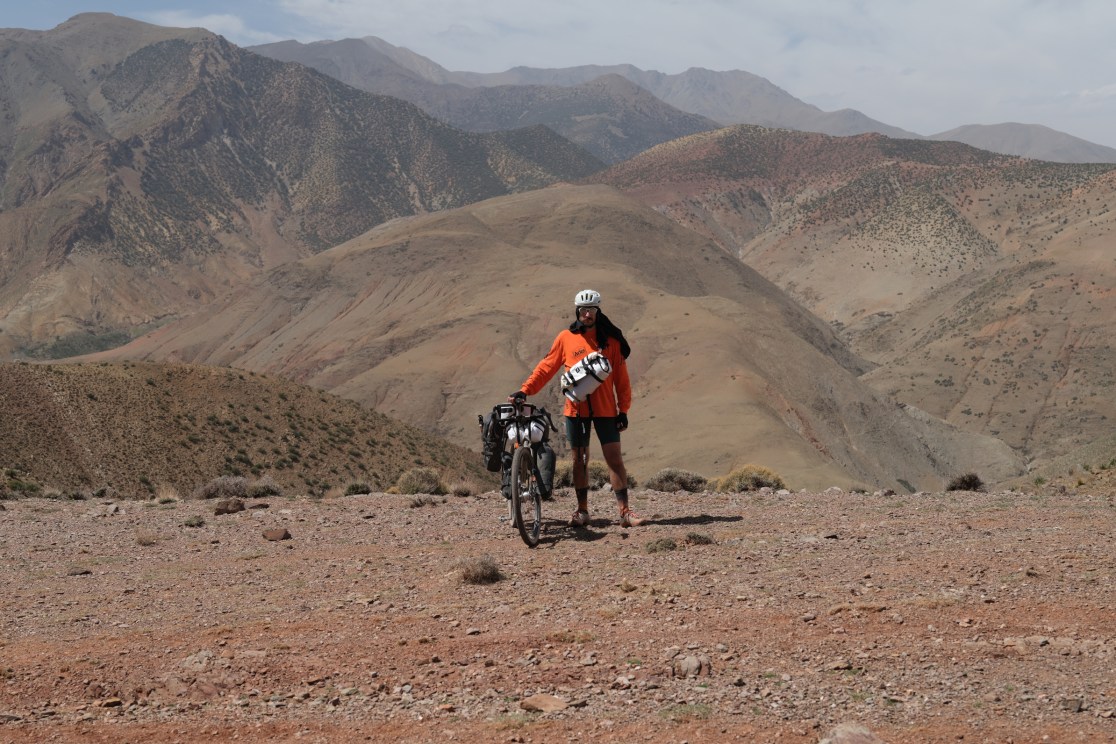
Disco monkey
By the time we arrived back in Marrakech, we were feral. Burned and bitten, dirty and stinking, covered in dust and ravenous. We mingled with the other tourists like a pack of stray dogs let loose at Crufts, trying to sniff out a decent coffee. We stopped at a ‘fancy’ restaurant. It was the first vendor of coffee we encountered.
“I’m sorry we don’t have any tables at the moment.”
“That’s fine, just give me three coffees, and some water I’ll sit on the pavement.”
I’d barely spent £30 in a week so, just this one time, London-priced coffee in Morocco was fine. We sat on a wall in the shade, sipped our coffees and took it in turns to use the ‘European toilet’. That night we washed and hit the town. Jan and I got haircuts from a barber we spent a while talking to. Another customer came in. “Hassan is very good,” the gaunt, wide-eyed barber told my reflection as he aggressively rubbed some kind of gin into my scalp. Hassan had a monkey on a lead, wearing a disco ball-coloured tracksuit.
“Hi Hassan!”
“Are you filming me?! Don’t film me! I never gave you permission to film me!” “I’m not even holding a camera…”
“Ok. I just wanted to make sure. I’m wanted, and I don’t want anyone to know where I am.”
“What did you do?”
“I didn’t do anything, I took the rap for John Gotti and went to Alcatraz. Best seven years of my life; it’s where I converted to Islam, and I became the prison Imam. Now I don’t even piss on trees in case someone wants to sit under them and then they get covered in my piss. No one wants to be covered in piss. You can record this if you want.”
He made himself comfortable on a chair by the cathode ray television in the corner, and his monkey was screeching and tugging at his sleeve. He gave her a hard slap with the back of his hand.
“Shut up you little bitch!” he shouted before continuing, “All creatures are made by god, and so I have to be considerate towards them, which is why I never piss on trees. It’s disrespectful to god’s creation.” He lit a crack pipe and took in a lungful of smoke before lighting it again and passing it over to his six-month-old monkey. He continued to serenade us with his life story, from gifted child to gymnast, to gangster to Imam to hustler. I wasn’t sure what he was selling and I’m not sure that he knew either.
Creative space
For the duration of the trip, I doubled up on all of my time being a human with human needs like food and water and shelter and rest. I was hungry and thirsty and my body hurt. I was alive. No part of it was comfortable, so I forgot about being late for five deadlines, and the 600 emails I had to reply to. I forgot about needing to post on social media or caring about the news because it didn’t matter. All that mattered was making it to the end of the day, which I guess when you strip things back to their core is all that ever matters. I rode a lot of the route alone, partly because I was just much slower than the others (who were extremely fine and super nice about sometimes having to wait for 45 minutes at a time on top of a mountain for me to catch up). I was completely uncompromising about stopping to film, or take photos or just look at things when I wanted to, because although we were covering decent distances there was no urgency to do anything at all.
I think time spent without any concerns beyond staying alive is key to creativity but perhaps so are mountains. Maybe it’s the thin air, or just exhaustion that brings about states of religious experience. When you’re on a mountain you are closer to god, who I like to think of as a Greek god. Just a big flawed immortal manbaby in the sky, having tantrums when things go wrong, but mostly just having a nice time looking at the little people on earth and thinking how silly and ephemeral they are. Or just a big ball of ideas floating around in space, which you’re 2,000m closer to when you’re on a mountain. It’s inspiring being up there, away from anything.
The final day it rained solidly, and Marrakech was awash with filthy grey water. I squelched around from hammam to hammam in soggy barefoot shoes seeking a glimpse of perverse tourist-class luxury. But there was no room at the inn. I flew home battered and messy. Everything stayed in pieces for days. The whole thing felt more like an ordeal that I’d survived rather than a holiday. But while I was deeply exhausted and steeped in chaos, somehow a bit of pain and hunger did me good in a spiritual or psychological sense. It reminded me that I don’t really need much to eat, as long as I can exist a bit, and do some human stuff.
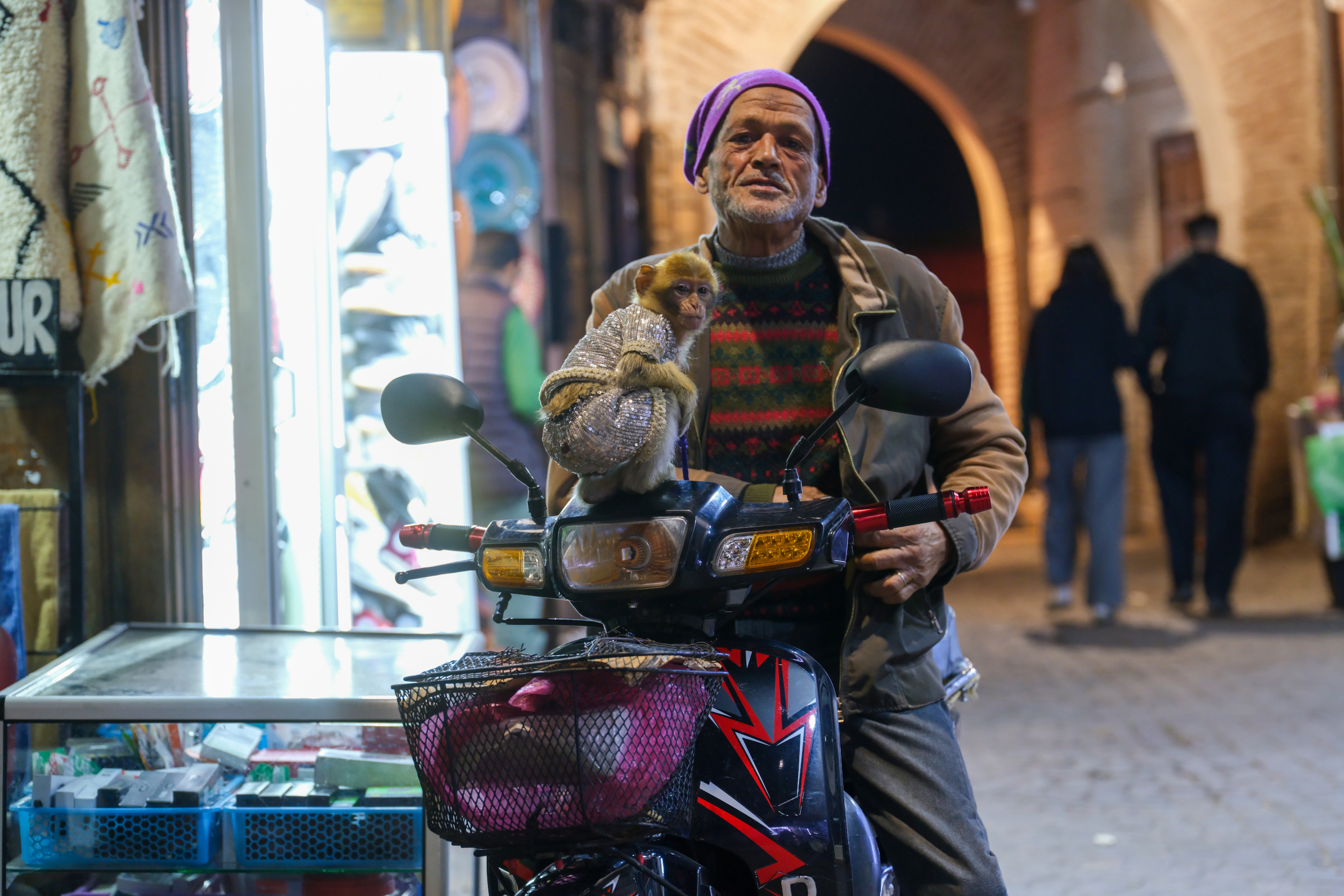
Epilogue
Morocco is amazing, but with nice food and being allowed proximity to women, I would have enjoyed the trip while I was on it, rather than eight months later. It was the trip I needed rather than the trip I wanted. It challenged me in every way, and it changed the way I eat and ride since. You can’t exist properly and then just forget about it and go back to caring about software updates and SEO for blog posts. The ride made me hungry for further humanity and a better existence. Since the ride, I started painting again for the first time in close to two decades, which feels miraculous.
